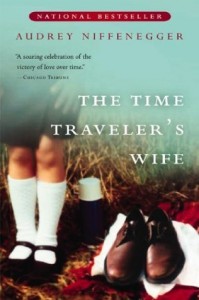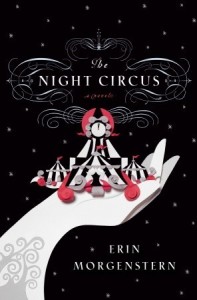I have just finished reading the most marvelous romance. Only it isn’t, strictly speaking, a romance. It’s the literary book The Night Circus, by Erin Morgenstern. It’s possible you could call it a literary book with romantic elements, but whatever you call it, it is one of the most romantic books I’ve ever read.
The circus arrives without warning. No announcements precede it. It is simply there, when yesterday it was not. Within the black-and-white striped canvas tents is an utterly unique experience full of breathtaking amazements. It is called Le Cirque des Rêves, and it is only open at night.
But behind the scenes, a fierce competition is underway—a duel between two young magicians, Celia and Marco, who have been trained since childhood expressly for this purpose by their mercurial instructors. Unbeknownst to them, this is a game in which only one can be left standing, and the circus is but the stage for a remarkable battle of imagination and will. Despite themselves, however, Celia and Marco tumble headfirst into love—a deep, magical love that makes the lights flicker and the room grow warm whenever they so much as brush hands.
It’s all there. Hero and heroine. Pitted against each other—battling for a high-stakes outcome. It’s not quite spelled out in the description, but they’re wounded, these young magicians. They’re wonktastically wounded, actually, because they’ve been pawns in their mentors’ game. Their love is, to put it bluntly, a terrible idea. Celia is the worst (and best) woman Marco could love, and vice versa. And the sexual tension? Insane. Never has not-kissing been so hot. Collaboration and competition are the best foreplay.
Spoiler Alert!
The Night Circus even has an HEA, of sorts. It is not the sort of HEA we are accustomed to, but I am picky about my HEAs, and I found this one incredibly satisfying. Celia and Marco will not, precisely, grow old together, but you cannot imagine an outcome in which an impossible love is more perfectly made right.
(There are other reasons you might not want to read this book if you are an implacable, dyed-in-the-wool romance reader. It is slow, like a flower unfolding into bloom in real time, and the hero and heroine are not always “onscreen.” I got a little stuck around the one-third mark because of the slowness. But I assure you, it was worth the effort of continuing.)
Still, it is a wonky HEA, and it made me think about what we expect from our love stories, and why. It reminded me  of a literary book that is even more definitely not a romance but that is probably my favorite love story of all time, The Time Traveler’s Wife. More spoilers ahead. The Time Traveler’s Wife is a tragic brick-to-the-head of a book, and yet I know I will reread it, because it was one of the most brilliantly plotted and convincingly constructed love stories I have ever read. It was gorgeous the way Romeo and Juliet is gorgeous, only with less adolescent sturm und drang and more real, grown-up love. It had all the elements of the very best romances, and if you’re willing to forget everything you’ve ever believed about the progress of time, it has a forever quality to it, where in some inwardly-wound, God’s-time version of the world, the time traveler and his wife will meet again and again. (If you haven’t read it and hate sad endings, stay away!)
of a literary book that is even more definitely not a romance but that is probably my favorite love story of all time, The Time Traveler’s Wife. More spoilers ahead. The Time Traveler’s Wife is a tragic brick-to-the-head of a book, and yet I know I will reread it, because it was one of the most brilliantly plotted and convincingly constructed love stories I have ever read. It was gorgeous the way Romeo and Juliet is gorgeous, only with less adolescent sturm und drang and more real, grown-up love. It had all the elements of the very best romances, and if you’re willing to forget everything you’ve ever believed about the progress of time, it has a forever quality to it, where in some inwardly-wound, God’s-time version of the world, the time traveler and his wife will meet again and again. (If you haven’t read it and hate sad endings, stay away!)
I’m definitely not trying to argue here against the strictest, most important, most immovable hard constraint of our genre ever made. If the hero and heroine cannot live happily EVER after, by which I don’t mean in the literary twisty sense but in the real-life, growing-old-as-one-minute-passes-after-the-next sense, it’s not a romance. I believe that more than anyone, because I hate sad endings.
For what it’s worth, the ending of The Time Traveler’s Wife made me sad. The ending of The Night Circus didn’t. So I’m going to go out on a limb and claim it for romance. Our genre would be richer for owning it in all its wonktaskitude.
But regardless of whether it’s romance or not, it’s a book that romance readers, particularly those who are attracted to the wonkier margins of the genre, will love. What’s more, The Night Circus is a book that romance writers can learn from: a dusk-’til-dawn workshop on the flirtation between language and love, a lesson in life-or-death stakes, and a primer on all the ways bliss flirts with agony.























Holy Craptastic! That book looks amazing. (Adding it onto my TBR pile right now). A book can be very romantic without technically being a “romance” (having the HEA, etc). I personally hate sad endings, too. But I also don’t like reading contemporary romance filled with irritating real-life problems….not romantic. Might have an HEA, but that’s not romance in my mind. I love super romantic books that have the HEA..the whole enchilada. Like Mary Balogh’s books….Simply Love for example. Soooooo romantic. Love that one! Thanks for the rec…looking forward to reading this!
Interesting about the irritating real-life problems. Coming from having written literary before romance, I tend to put these in, but lately I’ve realized I don’t love reading about them and I don’t have to write them! It’s very liberating.
And The Night Circus is great in that way because it’s soooo not real life. Like a dream. I felt like it was transporting (I originally said “escapist” but wanted something more positive) in a way not even most genre romance I’ve read has achieved.
And I love Mary Balogh, though I’ve only read the Slightlies, not the Simplies. And a few others. I am hoarding the Simplies for a later fix …
Thanks for this rec, Serena. I love it when people tell me about lit-fic that’s romantic and NOT sad at the end. And wonktastitude? Bonus! I don’t mind some sad stuff in the middle of books (beginnings are sometimes problematic, tho, lol)–in fact I deeply love angst and heartache. But it must be overcome satisfyingly in order for me to dig it. It’s just super hard for me to get invested in fiction that could potentially send me over the abyss–you know, stuff that gives you that awful head-explodey feeling that comes when you’re trying so desperately not to sob. And then you do sob. And your day/week etc are tinged with melancholy that might have felt good when you were nineteen and broody, but not so much when you’re middle-aged and weary. :-)
I made my husband read Time Traveler’s Wife first and report to me on it’s sadness factor. Was bummed when he said it walked along the edge of my hated abyss. I resisted the hell out of it even though it sat there on the bookshelf looking all intriguing and the publicity/buzz for it never stopped. Yes, I know I’m likely missing something great, but this proves the depth of my fear of head-explodey stuff.
Anyway, a primer on the ways bliss flirts with agony sounds awesome.
For years (before I re-discovered romance, which I had only read a little of as a young teenager), I had NO idea there was a whole genre of books that guaranteed a happy ending. When I discovered them, I thought: What have I been doing, torturing myself all these years??
The only problem is that sometimes I’m convinced I’m going to get an HEA when I’m reading/watching something that doesn’t, in the slightest, guarantee one. Like Up in the Air or True Grit, both of which I allowed myself to be convinced would end happily. That was just willful self-delusion.
I hope you enjoy The Night Circus as much as I did (and the rest of my book club loved it too–so much, in fact, that the woman who hosted that meeting prepared an entire “midnight dinner” in the style of the book–it was fabulous).
This book sounds fascinating! Thanks for the review.
It reminds me of a novel I read years and years ago that was deeply, horribly wonked. Not romantic, if I remember right, though it might have had a romantic subplot? But circus-themed, and SO strange: Geek Love by Katherine Dunn.
Loved that book. That might be the most wonked book I’ve ever read.
And yes, some similarities to The Night Circus, but mood- and theme-wise, completely different.